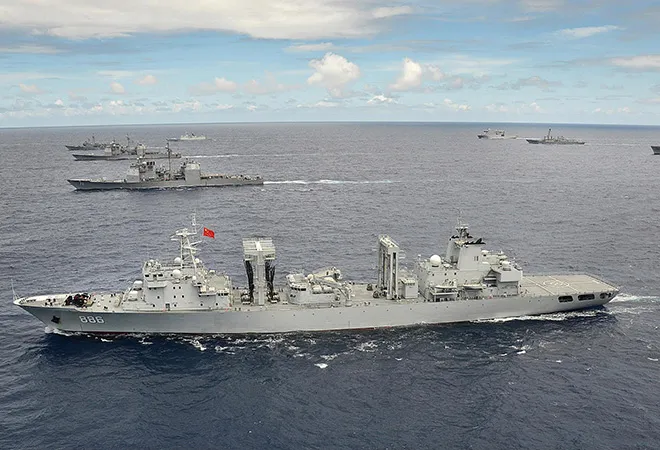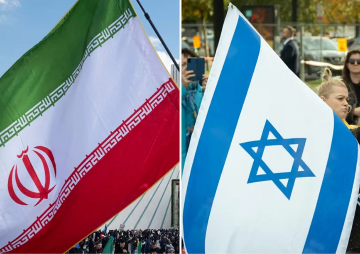
What India does, China now wants to do better. Thus far, Chinese copy-cat acts have been confined to economic policies and technological innovations of the West, mainly the United States. Today, it is seeking to ape India’s India Ocean Region (IOR) policy by proposing a council of small island-nations in the Indian Ocean Region. This comes barely a few years after India’s Ministry of External Affairs (MEA) had restructured IOR oversight by first creating an IOR division and later adding farther neighbours that are not far away from India’s own island-territories.
Today, the MEA’s IOR division covers near-by neighbours such as Maldives and Sri Lanka, middle neighbours such as Mauritius and Seychelles, and has lately added farther neighbours like Comoros, Madagascar, and French Réunion—all of them island-nations. More recently, MEA also created a separate division to cover the Indo-Pacific Region.
At the end of his five-nation visit, China’s State Councillor and Foreign Minister Wang Yi, in his meeting with Sri Lankan counterpart G L Peiris, ‘proposed to establish a forum for the development of Indian Ocean island-countries’. This was contained in a Chinese Foreign Ministry statement released in Beijing after the minister’s visit, which took him to Comoros, Maldives, and Sri Lanka, apart from Eritrea and Kenya, which, of course, are not island-nations.
China’s State Councillor and Foreign Minister Wang Yi, in his meeting with Sri Lankan counterpart G L Peiris, ‘proposed to establish a forum for the development of Indian Ocean island-countries’.
Indian media reports and analysts mostly ignored all but the Maldives and Sri Lanka legs of Wang’s maiden overseas tour in the new year. They ignored how in East Africa, he had announced the appointment of a Special Envoy of China for the Horn of Africa region.
They also overlooked his near-India IOR tour commencing in Comoros, a late addition to the MEA’s IOR Division portfolio. Likewise, media reports on closely-knit IOR neighbours of India, Maldives and Sri Lanka, were based exclusively on the official statements of home governments, and did not mention the visitor’s proposal made to his Sri Lankan counterpart. On Maldives, if the visitor had discussed the same or similar proposals, the Chinese side too did not publicise it.
Wider than two options
The Sri Lankan media thus highlighted how President Gotabaya Rajapaksa held ‘cordial talks’ with Wang Yi and sought debt restructuring, which was a major concern for his nation, government, and leadership, steeped in unprecedented forex and economic crises, both threatening a political upheaval. The Chinese Foreign Minister also met with Prime Minister Mahinda Rajapaksa, to whom he recalled the latter’s presidential years (2005-15), when he had visited China six times. In turn, PM Mahinda urged the visitor to facilitate the early return of Sri Lankan medicos stranded in their homes, following the global pandemic.
In Maldives, the local media quoting their Foreign Ministry statement, reported that the two sides signed five agreements on mutual cooperation, confined mostly to social infrastructure projects. If either President Ibrahim Solih or Foreign Minister Abdulla Shahid, who is also the current President of the UN General Assembly (UNGA), sought further debt restructuring, it went unreported. Instead, reports spoke about China promising MVR 968.2 million in grant assistance to Maldives under an Agreement of Economic and Technical Cooperation, one of the five signed on the occasion. In a statement post-visit, Chinese envoy to Maldives, Amb Wang Lixin, elaborated on what she listed out as, “one important visit… two major goals…three important messages…four key directions (and) five cooperation documents…” as the outcomes of Wang Yi’s Malé stop-over.
The minister expressed similar sentiments when Indian High Commissioner Munu Mahawar paid a courtesy call to him, where they discussed bilateral cooperation, including the progress of India-funded projects.
In an interview to the local media, Foreign Minister Abdulla Shahid said that, “going against a specific country is not the most beneficial to the Maldivians.” He referred to the Opposition PPM-PNC combine’s ‘India Out’ campaign, and said, “Maldives needs a foreign policy that is wider than what can be concluded by choosing from two options”—the other being China. The minister expressed similar sentiments when Indian High Commissioner Munu Mahawar paid a courtesy call to him, where they discussed bilateral cooperation, including the progress of India-funded projects.
At his meeting with Comorian Foreign Minister Dhoihir Dhoulkamal at capital Moroni, on way to Malé, Wang Yi recalled how China was the first nation to recognise the other after its independence and also establish diplomatic ties 47 years ago. As in other IOR capitals, according to a Chinese Embassy Press release, he spoke about development cooperation.
In response, the host underscored that the “friendship between Comoros and China is long-lasting and strong…marked by deep political mutual trust, win-win economic cooperation and mutual support in the international arena.” Comoros, he added, “consistently pursued the one-China policy, and this position is firm”. From an Indian IOR perspective, this was as important as Wang Yi’s engagements in Malé and Colombo.
Third-country interference
The form of government in both Maldives and Sri Lanka is Executive. Both have their own functional characteristics. Thus, in Maldives, Wang Yi addressed substantive issues at delegation-level talks with counterpart Abdulla Shahid. If he had discussed anything specific and sensitive with President Solih, it has not got any mention in public.
In contrast, in Sri Lanka, President Gotabaya headed the Sri Lankan delegation at the official-level talks. Foreign Minister Peiris was present along with other senior officials. It is, thus, unclear if what Wang Yi had claimed to have told counterpart Peiris had made it to the President’s ears too.
In talks with the Sri Lankan leadership, according to the Chinese Foreign Ministry statement, Wang Yi said that ‘no third country’ should ‘interfere’ in the close ties between the two. The reference was, of course, to India, but the tone and tenor of Wang’s statement is not known, to conclude if it was a pre-condition for Beijing to rush to Colombo’s aid in the future, in the economic and political fronts.
Beijing’s political support for Colombo comes in the form of China’s unequivocal and unconditional support along with Moscow’s at UNHRC-Geneva and the UNSC, where both hold veto vote.
In the current forex and economic crises, Sri Lankan desperation to obtain assistance from whichever source other than IMF is well known. It is immaterial that Wang Yi obviously did not acknowledge that much of the problem is due to the Chinese ‘debt-trap’. Beijing’s political support for Colombo comes in the form of China’s unequivocal and unconditional support along with Moscow’s at UNHRC-Geneva and the UNSC, where both hold veto vote.
Significantly, Wang’s visit is the second instance in as many months where China has flagged ‘third-party interference’ in ties with Colombo. Last month, the Chinese Embassy in Colombo tweeted the suspension of work on hybrid energy plants on three islands off Sri Lanka’s Tamil-majority northern Jaffna Peninsula, citing ‘security concern’ from a ‘third party’. The reference again was to India, which was concerned about China-funded projects too close to the southern Tamil Nadu shores across the Palk Strait.
Taking a near-similar line while briefing local media persons about Wang Yi’s visit, post facto, Chinese Ambassador Qi Zhenhong in Colombo referred to the halted/delayed talks between the two sides on a proposed Free Trade Agreement (FTA) and a Comprehensive Economic and Technical Framework Cooperation. “During the State Councillor’s visit this time, he and Sri Lanka’s government had a very good discussion” on both, the Envoy said.
In context, Amb Zhenhong asked why Colombo had halted the FTA talks. “Already we had six rounds. I would like to ask the Sri Lankan government why the talks were halted. I don’t know why,” he said in public. According to him, “if Sri Lanka is able to have this FTA, it can export products to a market of 1.4 billion population in China”. He did not mention that the talks, which commenced under the previous regime, was halted owing to some Chinese conditions proposed in the FTA.
Calculated ‘misses’?
For all this, however, there were also what looked like ‘calculated misses’ when Wang Yi was visiting. In Maldives, he did not meet with Opposition PPM-PNC leader Abdulla Yameen, former President out from prison after the nation’s Supreme Court let him off in a money-laundering case dating back to his days in office (2013-18). Seen as a friend of China amongst Maldivian leaders, Yameen is still facing two more graft cases of the kind, whose verdicts have the potential to once again disqualify him from contesting the presidential polls in late 2023.
Likewise, in Sri Lanka, the Chinese visitor belied some hopes to visit the Tamil North, which is of great political, economic, and now strategic significance to the Indian adversary. In recent weeks, Amb Zhenhong had done the trip, taking a boat-ride as close to the International Maritime Border Line (IMBL) with India as was practical, raising eyebrows in New Delhi.
In Sri Lanka, the Chinese visitor belied some hopes to visit the Tamil North, which is of great political, economic, and now strategic significance to the Indian adversary.
While in Jaffna, Amb Zhenhong had also visited the famous Nallur Kandaswamy Temple, wearing a dhoti and bare-chested like a tradition-bound Hindu male. He distributed accessories to the iconic Jaffna Library, burnt down by Sinhala hooligans in the ’80s, and also relief packages to local fishers, whose livelihood has suffered because of bottom-trawling and poaching by their own Tamil brethren from India.
In all this, the ubiquitous Chinese message was clear. They would continue to do business with whichever government the locals elected in democratic third-world nations, and wait for their friends to come back to power in their turn. Maldives is a case in point. Likewise, they would not want to embarrass their friends in power, as in Sri Lanka, by over-playing their strategic irritants vis-á-vis a third nation, India in this case. This time round, it may also have to do with Sri Lanka concluding the much-delayed Trincomalee oil tanks farms deal with India, against forex assistance now, and possibly later. Maybe, there is a lesson in it for India, too.
Otherwise, indications are that the Chinese visitor possibly could not break the Maldivian leadership of President Solih, and there is no reason to think that he even attempted it beyond a point. In Sri Lanka, his visit is believed to have set right the latest tensions surrounding Colombo’s initial refusal to pay up the monies due to a Chinese firm, as the ‘organic fertiliser’ supplied was harmful in local conditions.
As it turned out, Sri Lanka paid up US $6.9 million to the Chinese supplier, after causing a local court to withdraw a payment ban, just ahead of Wang Yi’s visit. In turn, the Chinese embassy removed the name of the public sector People’s Bank from its ‘black list’ as the latter had held up payment to the fertiliser supplier, citing the court order.
The views expressed above belong to the author(s). ORF research and analyses now available on Telegram! Click here to access our curated content — blogs, longforms and interviews.




 PREV
PREV


